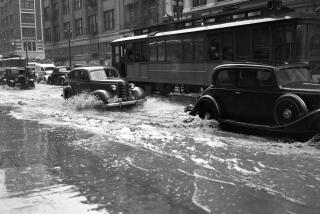So, Hot Enough for Ya? : Complaining About the Weather Is Universal--But It’s a <i> Good Thing</i>
So, how about this weather?
Too muggy for you? Sun too bright? Not bright enough? A bit chilly? Too smoggy?
Even on the most glorious blue-skied, soft-breezed, puff-clouded day there ever was, someone somewhere is unhappy.
When it comes to weather, any weather, there is always something to complain about. And, according to behavior experts, that is not only normal, it is a Good Thing.
Indeed, they go so far as to say that complaining about weather is about the healthiest thing humans can complain about.
Sort of the silver lining turned inside out.
In the political minefields of modern conversation, it seems, commiserating about the weather may be the last, best safe way for us to communicate.
“It’s human nature perhaps to look for something to complain about. And weather is something we can complain about without personalizing it. We can complain without blaming,” says Todd Glickman, assistant executive director of the American Meteorological Society in Boston.
“It connects us in a certain way that no other topic of conversation can,” he says. “And since weather is rarely the same all the time, it is rarely good for all people all the time.”
That is to say, when it’s bad, it’s good?
“Right,” Glickman says enthusiastically. “For example, today is my birthday and I’m sitting here at my desk in wet socks and cold feet because I got caught in the rain as I was running across Boston Common for lunch!”
NBC weatherman Fritz Coleman sees a pattern to the 13 years of weather complaints he’s heard.
“This is so typical,” Coleman says. “A few days ago, people were saying this is the gloomiest spring we’ve ever had, when is the sun coming out? Then it did and they complained some more.
“You have to remember, weather is one of the few things we all have in common. It is one element in our newscast that affects everyone. Even if you have no opinion on Bosnia, you do care about the weather,” he says. “And around here, complaining about the marine layer has become sort of a communion.”
Adds Los Angeles psychologist Robert R. Butterworth: “In this age of political correctness where so many subjects are taboo, this is one of the few subjects we can show outrage about.”
Butterworth, a transplanted New Yorker, is speaking from his car phone at midday on a recent scorcher. He has pushed the moon roof open and turned the air conditioning on full blast.
“I don’t know about you,” he sniffs, “but I’ve got a heck of a cold and I know it’s because of this crazy weather!”
Of course it is. But what makes Californians, who have some of the best weather in the world, carry on so?
“It’s our high expectations. We’re definitely very sensitive about the weather in Southern California. After all, it’s the main reason we’re still here,” Butterworth says. “People really feel, ‘Gee, we’ve had so many problems here in L.A. We’ve got the weather at least.’ ”
Some believe that for Californians, especially Angelenos, weather is tied to our beleaguered sense of self-esteem. “Great weather is one of those things that keeps our city’s ego alive,” Butterworth says.
Years ago, researchers identified weather’s influence on the human brain. Physicians have diagnosed its effects on the immune system, and as the citizens of Seattle know, too little sunlight can cause seasonal affective disorder.
For sufferers of SAD, at least there is a biological explanation for feeling cloudy inside when it’s cloudy outside. And for the severe cases, there are powerful antidepressants.
But for everybody else, grumbling about the heat, the cold, the rain, the snow may be equally therapeutic.
Complaining about weather, psychologists say, is not only a safe way to vent anger and aggression--”I can’t believe it rained on my beach wedding!”--it can also be one of the most satisfying. After all, who isn’t going to agree you should be outraged? Therapists call this validation.
Complaining about the weather can go too far, of course. Mike Smith, the president of WeatherData Inc., a commercial meteorological service, has survived years of “people coming up to me demanding that I personally do something to change the weather. I once was threatened with firing because I refused to forecast rain for a farming community in the middle of a terrible drought.
“Of course, I can’t change the weather, but personally, I don’t complain about it either. Most meteorologists are challenged by the variety of weather.”
But not always.
“When I’m on vacation, I don’t want that variety. I figure out statistically what the weather will be before we go and I’ve never had a vacation washed out. Maybe that’s why I don’t complain.”
More to Read
Sign up for Essential California
The most important California stories and recommendations in your inbox every morning.
You may occasionally receive promotional content from the Los Angeles Times.










